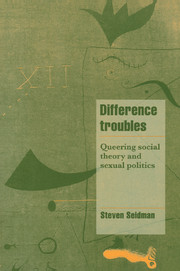Book contents
- Frontmatter
- Contents
- Preface
- Acknowledgements
- Introduction: the contemporary reconfiguring of social theory
- Part I Resisting difference: the malaise of the human sciences
- Part II Engaging difference: from lesbian and gay studies to queer theory
- Part III Democratic prospects: the politics of knowledge and identity
- 8 Transfiguring sexual identity: AIDS and the cultural politcs of sexuality and homosexuality, 1981–1986
- 9 From gay ethnicity to queer politics: the renewal of gay radicalism in the United States
- 10 Postmodern anxiety: the politics of epistemology
- 11 The politics of sexual difference in late twentieth-century America
- 12 Difference and democracy: group recognition and the political cultures of the US, Holland, and France
- Epilogue: pragmatism, difference and a culture of strong democracy
- Notes
- References
- Index
9 - From gay ethnicity to queer politics: the renewal of gay radicalism in the United States
from Part III - Democratic prospects: the politics of knowledge and identity
Published online by Cambridge University Press: 05 October 2010
- Frontmatter
- Contents
- Preface
- Acknowledgements
- Introduction: the contemporary reconfiguring of social theory
- Part I Resisting difference: the malaise of the human sciences
- Part II Engaging difference: from lesbian and gay studies to queer theory
- Part III Democratic prospects: the politics of knowledge and identity
- 8 Transfiguring sexual identity: AIDS and the cultural politcs of sexuality and homosexuality, 1981–1986
- 9 From gay ethnicity to queer politics: the renewal of gay radicalism in the United States
- 10 Postmodern anxiety: the politics of epistemology
- 11 The politics of sexual difference in late twentieth-century America
- 12 Difference and democracy: group recognition and the political cultures of the US, Holland, and France
- Epilogue: pragmatism, difference and a culture of strong democracy
- Notes
- References
- Index
Summary
For whatever reason, society rejects the homosexual … above all simply because he is homosexual. He is seen first and foremost as a homosexual … The homosexual then becomes a victim of the same kind of thinking … Before change can be effected in others, … the homosexual must accept himself first as a man or woman more alike than different from other men and women. He will then discover that he can be accepted by others …
These words, printed in the Mattachine Review in December 1957, express a theory and politics of homosexuality widely shared among Americans involved in the so-called homophile movement. Homosexuality was viewed as a denning aspect of an individual's identity but it was not assumed to mark out a distinctive psychological and moral human terrain. Indeed, it was widely believed – and still is by many who are self described as homosexual – that a politics anchored in a concept of homosexual difference has the effect of perpetuating demeaning and disempowering images of “the homosexual.” For most members of the Mattachine Society and the Daughters of Bilitis, the legitimation of homosexuality pivoted on the claim that homosexuals share a common humanity with heterosexuals. Was this strategy a failure of nerve on the part of these homophile organizations? I do not think so. In the context of the 1950s in America, where homosexuality was framed as a difference that signified a deviant, polluted identity, it was not unreasonable, nor ineffective, for individuals to legitimate homosexuality by asserting a common, universal humanity.
- Type
- Chapter
- Information
- Difference TroublesQueering Social Theory and Sexual Politics, pp. 185 - 197Publisher: Cambridge University PressPrint publication year: 1997



